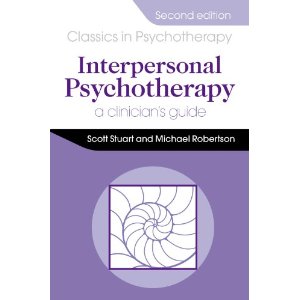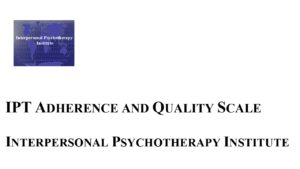
A Clinician’s Guide (2nd Ed)
IPT: A Clinician’s Guide is available through amazon.com and many other major distributors. The textbook is designed for clinicians using IPT in a clinical setting with a variety of patients with mood and anxiety symptoms. It describes in detail the IPT approach and structure, interpersonal and attachment theory, and clinical applications and techniques.
Click Here for a Preview: Chapter 3 Structure

IPT Quality and Adherence Scale
The IPT Quality and Adherence Scale is available for free to all clinicians. The scale was developed with funding from a grant from the National Institute of Mental Health, and is reliable and fully validated. Higher scores on the IPT Quality and Adherence Scale are correlated with better psychotherapy outcomes, and there is high correlation between supervisor and therapist self-ratings on the items included in the Scale.
The IPT Quality and Adherence Scale can be used in research settings as well as community clinical settings. IPT therapists and supervisors can use it as a guide to conducting IPT. The Scale is used to rate portfolios in all of the IPT certification programs.
An electronic version of the IPT Quality and Adherence Scale is also available– please contact us at iptinstitute@outlook.com if you are interested in accessing the electronic version.
PHQ-9 and GAD-7
The PHQ-9 (depression) and GAD-7 (anxiety) are short, reliable, and validated measures that can be used with IPT patients. We recommend using them at the beginning of treatment and every 4 sessions thereafter. They are required for use with IPT portfolios.

